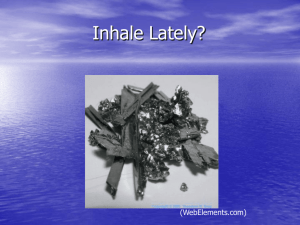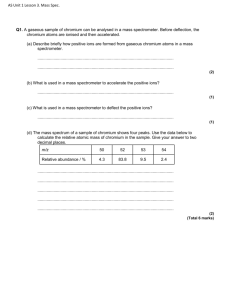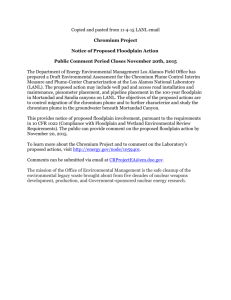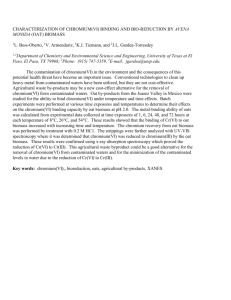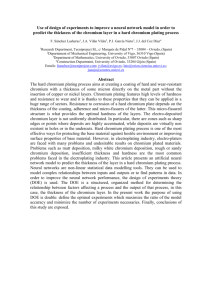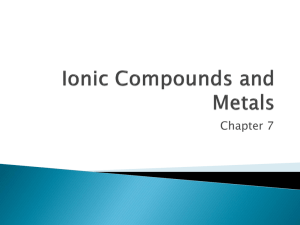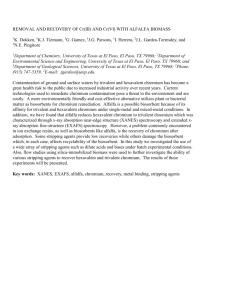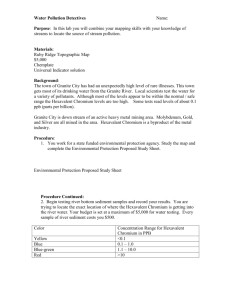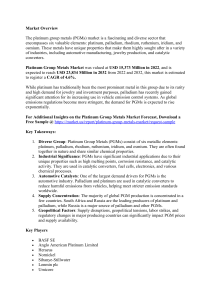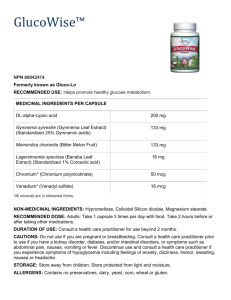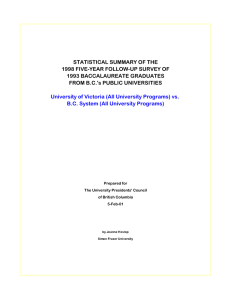Chromium and Platinum Group Metals
advertisement
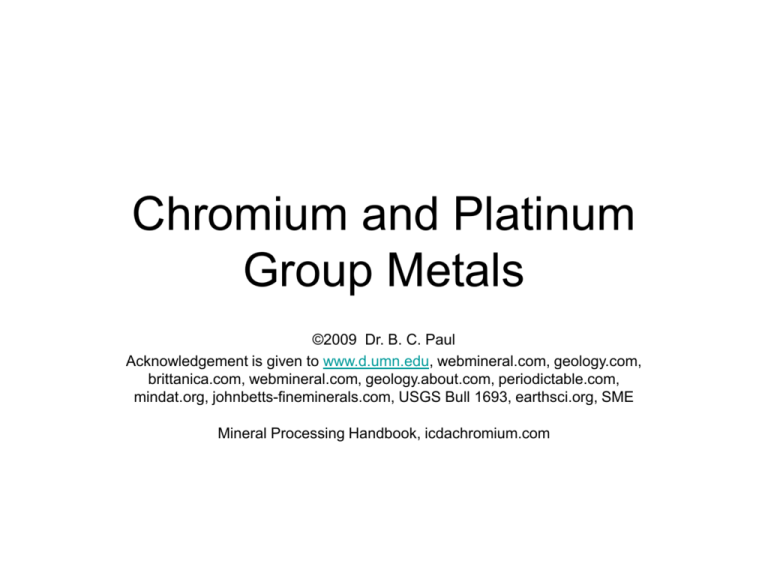
Chromium and Platinum Group Metals ©2009 Dr. B. C. Paul Acknowledgement is given to www.d.umn.edu, webmineral.com, geology.com, brittanica.com, webmineral.com, geology.about.com, periodictable.com, mindat.org, johnbetts-fineminerals.com, USGS Bull 1693, earthsci.org, SME Mineral Processing Handbook, icdachromium.com Chromium and PGM (Platinum Group Metals) • Mantle like material intrudes into continental crust – Reacts with sulfides and metals settle out at bottom – Common way to make Nickel Sulfide Deposits • Chromium and PGMs tend to settle out in specific layers • Get a little from the Sudberry meteor impact too. Settled Chromium Deposits The Ocean Floor Mechanism • Ocean floor comes from mantle like material forming new crust at a spreading ocean plate boundary • Sometimes when continents collide or run into things just right a chunk of sea floor gets dragged up into a continent – Called an Ophiolite sequence – Bottom part of the ocean floor can contains pods of Chromium rich ore Chromium Pods in an Ocean Floor Sequence Where Chromium and PGMs are Found Green colored areas At plate edges are Scooped up ocean Floor with Chromium pods Black areas show Where chromium And PGM layers Settled from mantle Intrusions into Continental crust You can get a few placers from these primary deposits too. Main Ore Mineral of Chromium is Chromite Chromite (black) interlayered with Sepentine (greenish) Fe2+Cr2O4 46% Chromium S.G. 4.5 – 5.1 Hardness 5.5 Color Black to Brownish black Tends to have granular texture Fresh Chromite Surface Weathered Chromite Surface Platinum, Osmium, Rhodium, Ruthenium, Palladium = PGMs Native Platinum Native Palladium PGMs can be native metals or substituted into other minerals Sperrylite PtAs2 57% Platinum S.G. 10.5 Hardness 6-7 Metal to white and brittle Podform Chromite Deposits are Smaller 22,000 tons of ore is a median – big ones may be 250,000 tons Grade of the ore is around 46% Chromic Oxide PGMs may be in the parts per billion range Little Chromite Pods May be Only 143 tons Ore grades are again around 46% Chromic oxide Chromium Processing • Chromite tends to be lumpy big chunks – Allows some separation in mining – Rest if needed can usually be done with gravity separation • Jigs • Heavy media separators • Tables • Lump Ore is Then Sent to Smelter Furnaces – Often melted together with iron – Some very intensive oxygen and ammonia processes may kill off residual carbon. The Gravity Concentrators Use the fact that something is heavy Heavies have more momentum – Shaking Tables Heavies sink faster – Jig Light stuff floats in a heavy fluid – Heavy Media Separator PGMs – A Tough Act to Process • PGMs in a good case are associated with nickel and copper sulfides – In nasty cases some of them are trapped in gangue minerals • Try to Float out the PGMs • Then send them to the smelter What Do We Use Them For • Chromium is mostly as a stainless steel alloy with some chemical and plating uses • PGMs are used mostly for catalysts for air pollution control systems, with some laboratory applications, and some jewlery What is Chromium Worth? Chromium Price/lb in $2009 to 2007 1.2 1 0.6 $2009/lb 0.4 0.2 2004 1996 1988 1980 1972 1964 1956 1948 1940 1932 1924 1916 1908 0 1900 $2009/lb 0.8 About $0.40 to $0.60/lb (prices based on chrome content of ferro-chrome What Are PGMs Worth PGMs Price in $2009 to 2007 25000 $2009/lb 20000 15000 $2009/lb 10000 5000 About $5,000 to $10,000 per lb but varies with metal Platinum around $12,000, Palladium around $4,500 Rhodium around $12,000 to $48,000 2004 1996 1988 1980 1972 1964 1956 1948 1940 1932 1924 1916 1908 1900 0 Production and Reserves of Chromium Chromium Production and Reserves 500000000 metric tonnes 450000000 400000000 Other South Africa 350000000 300000000 250000000 Kazakhastan India U.S 200000000 150000000 100000000 50000000 0 Prod*20 reserves metric tonnes PGMs Production and Reserves Production and Reserves of PGMs 80000 70000 Other Metric tonnes 60000 Zimbabwe 50000 South Africa 40000 Russia 30000 Columbia Canada 20000 US 10000 0 Prod*20 Reserves
